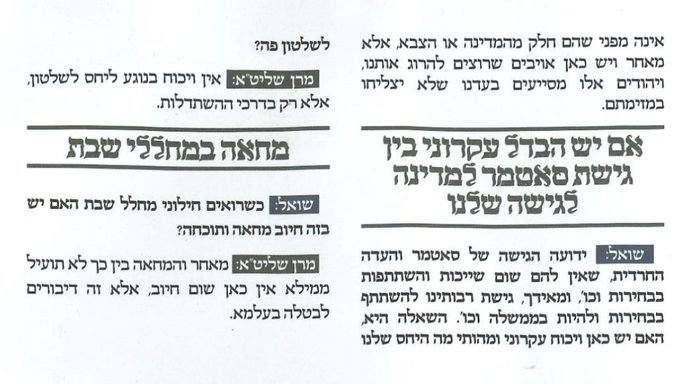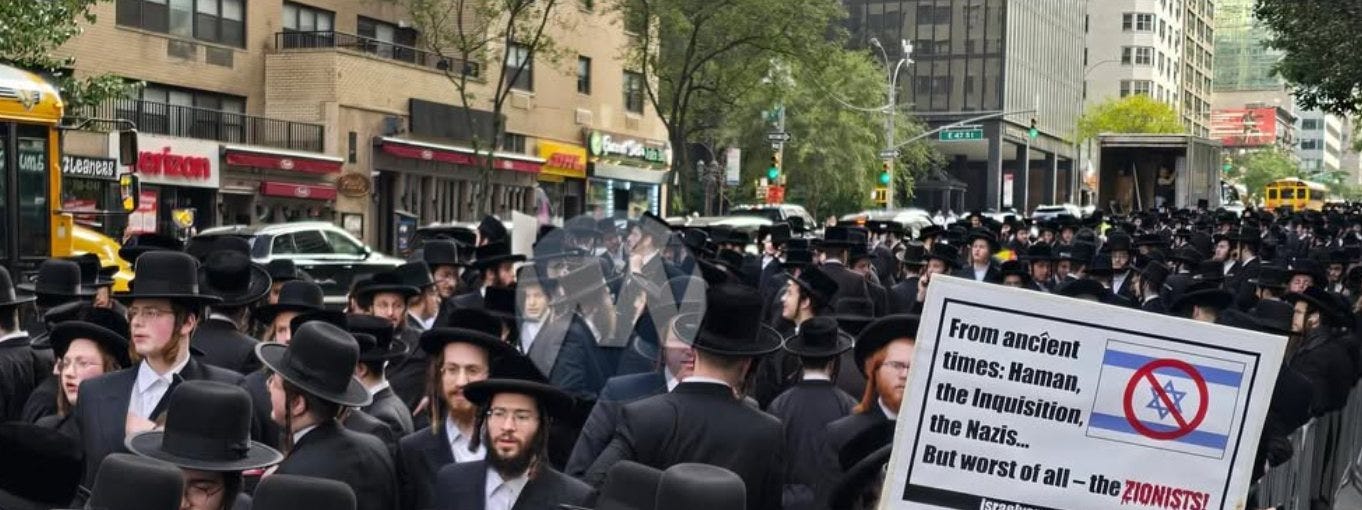Non-Zionists vs. Anti-Zionists
Which are worse?
Ever since charedi Judaism evolved into existence around a century ago, there have been different streams. Mainstream charedim were different (and differentiated themselves) from anti-Zionist streams such as Satmar and Neturei Karta.
The Satmar line was that the State of Israel was by definition evil and the work of Satan. The mainstream charedi approach, on the other hand, was that they did not take a position on whether statehood was a good thing or not, but anything led by secular Jews could not be definitively celebrated as having religious significance. Satmar was anti-Zionist, mainstream charedim were non-Zionist.
Recently, this gap has been shrinking. This week, R. Moshe Hillel Hirsch, co-leader with R. Dov Landau of the Charedi Litvishe world, made a surprising statement. It was recorded in the Slabodka Torah weekly:
R. Hirsch claimed that there is no dispute between the general charedi community and Satmar regarding how to relate to the state. The only dispute, he said, is with regard to the practical course of action.
This is quite the shocking statement. I wonder if, on his fundraising trips to the US on behalf of Keren Olam HaTorah, he is telling donors that he believes the State of Israel to be an evil entity. (Nah, of course he isn’t. Keren Olam HaTorah knows how to charm and deceive its donors with a “pro-Israel” angle.)
Regardless of R. Hirsch’s claim, many people consider Satmar to be far more harmful to Israel than mainstream charedim. The Satmar demonstration against Israel in Manhattan this week included signs declaring that the Zionists are worse than the Nazis. Such actions (along with their warm welcome for Mamdani) only serve to assist the enemies of the Jewish People, who cover up their antisemitism and Israelopathy by claiming that, as Satmar says, Israel doesn’t represent the Jewish People.
Yet while so many people consider Satmar to be worse, the opposite is actually the case. The mainstream charedi world is far, far worse for Israel than Satmar. And Satmar can be respected more.
Satmar might be horrendously ungrateful to God for the greatest miracle in the last 2000 years, but at least they have consistency and integrity. They believe that the state of Israel is an evil Satanic entity and they act accordingly by boycotting it. They don’t vote in Israeli elections and they don’t take state money (though of course they inevitably benefit in all kinds of ways from the existence of the state).
Mainstream charedim, on the other hand, are hypocrites - especially if, as R. Hirsch claims, their view of the state is identical to that of Satmar. And they are certainly vastly more damaging. Refusing to help with the war is bad enough, but they actively weaken the state by using their political power to drain it financially. As I have noted many times, even Jonathan Rosenblum pointed out in Mishpacha that the charedi way of life is an existential threat for Israel.
Likud is getting ready to draft a farce of a draft-exemption law that aims to enlist a mere 5000 out of 100,000 eligible charedim this year (and has no real enforcement mechanism). Now, some claim that it is simply impossible to draft charedim in significant numbers. But there are two problems with this claim. First is that nobody has ever actually tried. Second is that even if you want to take it as a given that it’s not possible to make it happen, why on earth does the country need to legalize and provide various financial aid and benefits to those who refuse to serve?!
I’ll take principled anti-Zionists any day over freeloaders who manipulate being part of Israel in order to take but are never willing to give.





Ultimately, it comes down to anti-Zionist charedim are joining with our enemies to destroy the Jewish people, while non-Zionist charedim are destroying Israeli society from within. They are both awful.
You might have added that last week Satmar invited Mamdami the probable next mayor of NewYork to their Suka. And fawned over him. He has repeated his commitment to see the Jewish State destroyed and his support for Jihad as well as calling Israel a genocidal state. If ever there were self hating Jews these must qualify.